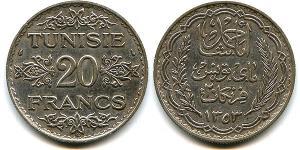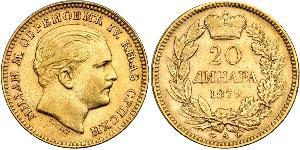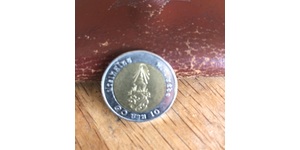1 Dinar Tunisia Silver
1969, Tunisia. Proof Silver 1 Dinar “Phoenician Ship” Coin
State: Tunisia
Mint Year: 1969
References: KM-297.
Mint Place: Franklin Mint, USA.
Denomination: 1 Dinar - Phoenician Ship
Material: Silver (.925)
Diameter: 40mm
Weight: 20gm
The Phoenicians, known for their prowess in trade, seafaring and navigation, dominated commerce across classical antiquity and developed an expansive maritime trade network lasting over a millennium. This network facilitated cultural exchanges among major cradles of civilization like Greece, Egypt, and Mesopotamia. The Phoenicians established colonies and trading posts across the Mediterranean; Carthage, a settlement in northwest Africa, became a major civilization in its own right in the seventh century BC.
Habib Bourguiba (Habib Burqibah; 3 August 1903 – 6 April 2000) was a Tunisian statesman, the Founder and the first President of the Republic of Tunisia from July 25, 1957 until 7 November 1987. He is often compared to Turkish leader Mustafa Kemal Atatürk because of the pro-Western reforms enacted during his presidency.
The youngest of eight brothers and sisters, Habib Bourguiba was born on 3 August 1903 in Monastir, 100 miles south of Tunis. Bourguiba attended school in Tunis at the Collège Sadiki and then at the Lycée Carnot. He obtained his Baccalaureate in 1924 and went to the University of Paris to study law and political science. While in Paris, the adult Bourguiba met Mathilde Lorrain, his landlady at that time, whom he married in 1927. The couple had their only son, Habib Bourguiba, Jr. on April 9, 1927.
The same year Bourguiba graduated with a degree in Law and Political Science, and returned with his newly formed family to Tunisia where he got immediately involved in political life by joining two newspapers in 1928: l’Etendard Tunisien (The Tunisian Flag) and Sawt At-Tunisi (The Tunisian Voice). In 1931, the French colonial authorities prosecuted him for his alleged “Incitement to racial hatred”. Subsequent to this, Bourguiba launched a militant newspaper L’Action Tunisienne, laying the ground for strong action against the colonial power.
As a member of the Executive Committee of the Destour Party, Bourguiba found himself less in tune with the mainstream party vision, which culminated in the Monastir incident of August 8, 1933 relative to the burial of a naturalized Tunisian citizen. Bourguiba was pushed to resign from the committee, which led to the creation of the Neo Destour Party in Ksar Hellal on March 2, 1934 with Bourguiba as the Secretary General of the Political Bureau. From that moment, Bourguiba set out to crisscross the country to try to enroll the majority of Tunisians from the countryside; and thus create a more popular base for his newly formed party so that he managed in a couple of years to set up more than 400 branches (cells) of the Neo Destour.
In September 1934, the colonial representative (Resident General) Mr Peyrouton ordered that Bourguiba be confined to Borj-Leboeuf, a remote place on the border of the Sahara desert, until April 1936 when he was released with most of his companions. After the popular uprising of April 9, 1938, where colonial troops opened fire on demonstrators killing and injuring hundreds of civilians, Bourguiba was once again imprisoned on June 10, 1939 along with a group of militants on charges of plotting against the state security and incitement to civil war.
At the outbreak of World War II, Bourguiba was transferred to the Teboursouk prison and then in May 1940, to the Haut Fort Saint Nicholas near Marseilles until November 18, 1942 where he was taken to Fort Montluc in Lyon. After which he ended up in Fort Vancia in Ain until the Germans released him and took him to Chalon-sur-Saône. In a manoeuvre by the Germans and Italian Fascist regime to gain Bourguiba’s alliance, he was received with full honours in Rome, in January 1943, but to no avail; the Italian Foreign Affairs Ministry tried to obtain a statement in their favour; on the eve of his return home, he accepted to deliver a message to the Tunisian people by “Radio Bari”, cautioning them against “all the appetites”. In his return to Tunis, on April 7, 1943 he made sure that the message he had sent from his prison in August 1942 reached the general population as well as the militants, that Germany was bound to lose the war and that Tunisia’s independence would only come after the victory of the Allies. He emphasized his position by putting it as a question of life or death for Tunisia.
After the end of World War II, Bourguiba, after many sterile efforts to open a dialogue with the French authorities, came to the conclusion that the Tunisian cause had to be brought to the attention of the world opinion. In March 1945, he left Sfax secretly, on a small fisherman’s boat, heading to Libya, and from there, on foot and on camel’s back, he managed to reach Cairo, which he used as a base for his international activity. He took part in the setting up of the Greater Maghreb Office. He travelled continuously to the different Arab countries, members of the newly born Arab League, Europe, (Switzerland, Belgium), to Asia, (Pakistan, India, Indonesia) and USA to promote the Tunisian aspiration for independence and met with high and influential personalities to help the Tunisian cause. On September 8, 1949, Bourguiba returned to Tunis to reorganise the Party and resume his direct contact policy with the population by visiting small towns and villages throughout the country.
In April 1950, he laid out a seven-point program aiming at ending the system of direct administration in Tunisia and restoring full Tunisian sovereignty as a final step to independent statehood. In 1951, he embarked on a second round of trips to promote his program at the international level. In light of the French Government refusal to concede to national claims, Bourguiba toughened his stance and called for unlimited resistance and general insurrection. This tactic led to his arrest on January 18, 1952 and his confinement in Tabarka, then Remada then in La Galite and finally Groix Island at the Ferte Castle.
Pierre Mendès-France became French prime minister in 1954; his positions on France’s colonial policies opened the door to Tunisian home-rule. June 1, 1955 saw the return of Bourguiba. The “Internal Autonomy Agreement” was a big step to total independence. After several arduous negotiations, independence was proclaimed on March 20, 1956, with Habib Bourguiba as president of the “National Constituent Assembly”, and Head of the Government. At the same time, he acted as the Minister of Foreign Affairs of Tunisia.
On July 25, 1957, a republic was proclaimed abolishing the monarchy and investing Bourguiba with powers of President of the Republic. Bourguiba’s long and powerful presidency was formative for the creation of the Tunisian state and nation.
After a failed experiment with socialist economic policies, Bourguiba embarked from the early 1970s on an economically liberal model of development spearheaded by his Prime Minister, Hédi Nouira for a ten-year period. This led to flourishing of private businesses and consolidation of the private sector.
On the international front, Bourguiba took a pro-Western position in the Cold War, but with a fiercely defended independent foreign policy that challenged the leadership of the Arab League by Egyptian President Nasser. In March 1965, he delivered the historical Jericho Speech advocating a fair and lasting peace between Palestinians and Israelis based on the UN 1947 Resolution that proposed two states.
Bourguiba signed an agreement with Libyan leader Muammar Gaddafi to merge nations in 1974. The pact came as a surprise because Bouguiba had rebuked similar offers for over two years previously. Weeks after the agreement, he postponed a referendum on the issue, effectively ending it weeks later. The idea of merging states was highly unpopular in Tunisia, and cost Bourguiba much of his people’s respect. The agreement was said to allow Bourguiba the presidency while Gaddafi would be defense minister.
In March 1975, the Tunisian National Assembly voted Bourguiba president for life, as an exceptional measure. In the 1980s Bourguiba made efforts to combat both poverty and a rising Islamist opposition, spearheaded by the Nahda party.
In 1979 Tunis became the headquarters of the Arab League after the Camp David Accords and in 1982, it welcomed the Palestine Liberation Organization’s (PLO) leadership in Tunis, after it had been ousted from Beirut during the Lebanese Civil War.
On October 1, 1985, Israel launched an attack against the PLO headquarters near Tunis. The Tunisian Armed Forces were unable to prevent the total destruction of the base. Although most of the dead were PLO members, there were casualties among Tunisian civilian bystanders. As a result, Bourguiba significantly downscaled relations with the United States.
On November 7, 1987 Prime Minister Zine El Abidine Ben Ali, in a coup d'état, declared President Habib Bourguiba impeached on medical grounds and constitutionally replaced him as President of Tunisia, on the basis of a strict reading of Article 57.
The Bourguiba government’s reforms include female emancipation, public education, family planning, a modern, state-run healthcare system, a campaign to improve literacy, administrative, financial and economic organization, suppression of the "Waqf" (aka, “frozen property”), and building the country’s infrastructure. Much of the reform goes to his adviser, Cecil Hourani, who, to Bourguiba’s credit, was selected by him.
During the time Bourguiba was president, education was a high priority. Bourguiba also promoted women’s rights as a way to gain Western support for his regime during the Cold War. Though these set important legal precedents by prohibiting polygamy, expanding women’s access to divorce, and raising the age at which girls could marry to 17 years old – he simultaneously banned women’s rights groups from organizing. The new Personal Status Code passed in August 1956 expanded women’s rights, though it remains open to debate how much this transformed Tunisian society in practice. Notably, the Code also institutionalized the role of the father as head of the family. After independence, Tunisia’s Jewish Community Council was abolished by the government and many Jewish areas and buildings were destroyed for “urban renewal”.
Bourguiba remained as President of Tunisia until November 7, 1987, when his newly-appointed Prime Minister and constitutional successor Zine El Abidine Ben Ali impeached him, claiming his old age and health reasons as certified by his own doctors made him unfit to govern. Ali himself was overthrown in 2011 in the first of the Arab Spring uprisings.
Bourguiba lived in Monastir under government protection in the Governor’s Mansion for the last 13 years of his life.
In 1925, Habib Bourguiba met his future wife, Mathilde Lorrain, in Paris while he was studying law at the Sorbonne. She converted to Islam and chose the name Moufida Bourguiba. She bore him one son: Habib Bourguiba, Jr. in April 1927. In a second wedding, he married the influential Wassila Ben Ammar and adopted a daughter, Hajer Bourguiba.
Bourguiba died on April 6, 2000 at the age of 96. He was buried with national honors on April 8, 2000 in a mausoleum in Monastir.
(3205 X 1590 pixels, file size: ~884K)
Posted by: anonymous 2024-04-11
Untitled Document 1969, Tunisia. Proof Silver 1 Dinar "Phoenician Ship" Coin. (20gm) PCGS PR-66DC! State: Tunisia Mint Year: 1969 References: KM-297. Mint Place: Franklin Mint, USA. Denomination: 1 Dinar - Phoenician Ship Condition: Certified and graded by PCGS as PR-66 Deep C ...
990 coins were uploaded from 2025-05-21 to 2025-05-28
One of them is:
















